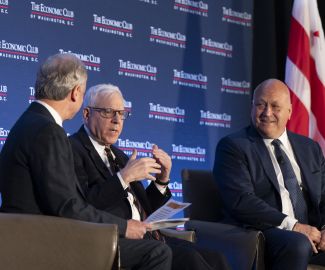The Economic Club of Washington, D.C. was pleased to host two New York Times bestselling authors, David M. Rubenstein, Co-Founder and Co-Chairman of The Carlyle Group, and Admiral James Stavridis, USN (Ret.), Vice Chair, Global Affairs and Partner, The Carlyle Group, as they interviewed each other on their new books.
The Highest Calling: Conversations on the American Presidency by David Rubenstein
The Highest Calling offers a comprehensive exploration of the American presidency through interviews with living presidents and renowned historians. Drawing from his experience in the Carter administration, Rubenstein provides an in-depth look at the most powerful office in the world. David Rubenstein, Chairman of The Economic Club, blends historical analysis with personal anecdotes, chronicling the journeys of presidents who have shaped modern America and their visions for the future. It features exclusive interviews with living U.S. presidents, including Bill Clinton, George W. Bush, Donald J. Trump, and Joe Biden, as well as insights from eminent historians and journalists like Ron Chernow and Maggie Haberman. Through these conversations, Rubenstein examines the qualities necessary for successful leadership in the Oval Office and offers a timely perspective on the presidency as the 2024 election approaches.
2054: A Novel co-authored by Admiral James Stavridis
2054: A Novel is a gripping work of speculative and cautionary fiction by a former Supreme Allied Commander of NATO. The story unfolds in a future America grappling with the aftermath of a catastrophic war with China and the rise of a new political party that has held power for over a decade. The novel opens with the sudden collapse and death of the American president during a national address, triggering a cascade of events including a cover-up, conspiracy theories, and the descent into a new type of civil war. At its core, the book explores the potential consequences of a breakthrough in artificial intelligence and its intersection with America's partisan divide. The authors combine their deep understanding of technology, geopolitics, and military strategy to craft a cautionary tale about the future of democracy and the potential risks of unchecked technological progress.


